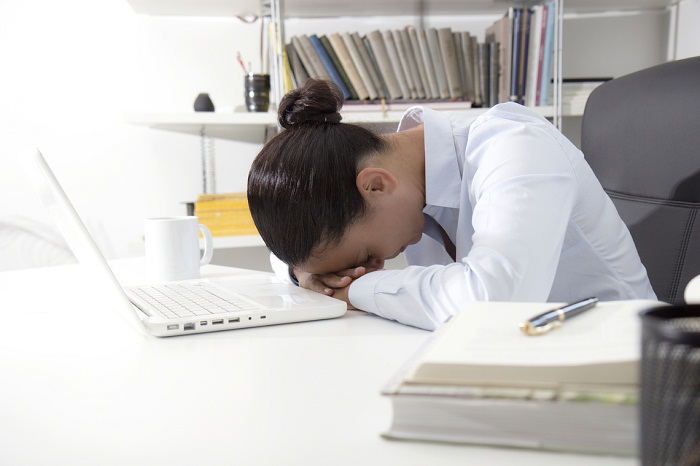The Physical Effects Of Having A Terrible Job
WE OFTEN TRUDGE THROUGH CRAPPY JOBS, LIVING FOR THE WEEKEND. BUT WHAT HAPPENS WHEN THOSE TOUGH WORK HOURS START AFFECTING YOUR PHYSICAL AND MENTAL WELLBEING?
Every day, millions of people get up and go to work. Some people are lucky and go to a job they love, but then there are some jobs that simply aren't made to be loved, whether it's because of the job itself or the environment the job is done in. The result is the same: Over time, a job you hate can have a serious impact on your health in a multitude of ways.

If you're considering whether it's time to quit a job that makes you miserable, consider adding these possible side effects to the list.
1. Increased risk of illness
Did you feel like you had more colds than usual this past winter? All the stress of a job you hate can deal a major blow to your immune system. Add to that the sudden bouts of acute stress you're likely to experience when deadlines approach, and you can almost guarantee a few illnesses a year. Plus, public areas and keyboards are breeding grounds for all kinds of germs, including some of the more serious ones, like E. Coli and staphylococcus. In fact, your keyboard could have up to five times more bacteria than the bathroom. Go clean it!
2. Weight gain
Sitting at a desk all day is bound to help you gain weight, even if you exercise. How much and what you eat is often affected by your environment, too, so a bad environment tends to lead to bad choices.
It's easy to break into that office candy when you're prone to stress eating and you're never not stressed at work. It's also easy to order Chinese and hit the couch to binge on your favorite show for a few hours after a hard day. Those poor choices, along with the constant cortisol your body puts out when you're stressed and overworked, mean that you're hungry for high-calorie foods and low on energy.
Combat all this by trying to get up and moving daily (we've all heard about the 10,000 steps) and packing a healthy lunch from home. The good news is that weight loss lowers your risks for all kinds of illnesses. Even just a weight loss of 10 percent can drastically improve your quality of life.
3. Prematurely aging
Studies show that chronic issues usually associated with age show up sooner in people who are overworked and have trouble separating themselves from their jobs. Even with the new standing desks that are available, being stationary for long periods of time still contributes to health issues.
While sitting for long periods leads to a higher risk of things like heart disease and cancer, standing has issues too. Back problems, fatigue and leg cramps are common among workers who rarely get to sit. So make sure to change positions regardless of how you usually work. If you're sitting, get up and go for walks, and if you're standing, make sure to take breaks sitting down.
4. Depression and anxiety
The stress of showing up and being in a place you hate for eight-10 hours a day, five or six days a week, can take a toll on your mental health. Studies have shown elevated levels of stress can lead to an increase in anxiety and depression for both men and women, especially when the stress is consistent.
5. Asthma
One thing most people don't think much about is the air quality of the building where they work. Especially in small businesses, which account for 89.6 percent of businessesin the U.S., air quality can be a pretty low priority, if it's even on the board.
In an office setting, the air inside can actually be dirtier than the air outside, which can trigger both major and minor irritants. Itchy eyes, sore throat, dizziness, headaches and asthmaare just some of the problems you can develop from being inside too much.
The solution actually isn't too difficult, especially if you have a window in your office. Open it! Especially during warm weather, leave it cracked a bit for some fresh air. If you don't have a window, then talk to your boss about the building's air filters. There's always a chance it simply never occurred to them to replace them, and filters are so cheap there's no reason not to.
6. Heart disease
Combine the low physical activity with poor food choices and stress that are prevalent in the workforce, and you have a recipe not only for heart problems, but for other serious issues as well, such as diabetes and cancer. In fact, some studies have shown excessive workplace stress can increase your risk of heart disease by as much as 40 percent. And since heart disease is the No.1 killer in the U.S., it's probably a good idea to try and reduce your risk, not exacerbate it.
What this comes down to is that where you work, and the stress you endure there, is important. Your health is drastically affected by your work, so make sure what you're doing is something that is worth the stress. It doesn't have to be your dream job, but it does have to be something you're at least slightly passionate about. If that's not your job, then look around for something better. If a different job isn't an option, then try and expand your qualifications.
A version of this article was originally published on Career Contessa, an online platform facilitating honest conversations by real women about work and life—to help you achieve fulfillment and balance in both.
(Picture Source: Internet)
HRVietnam selected from our website www.Careerbuilder.com

